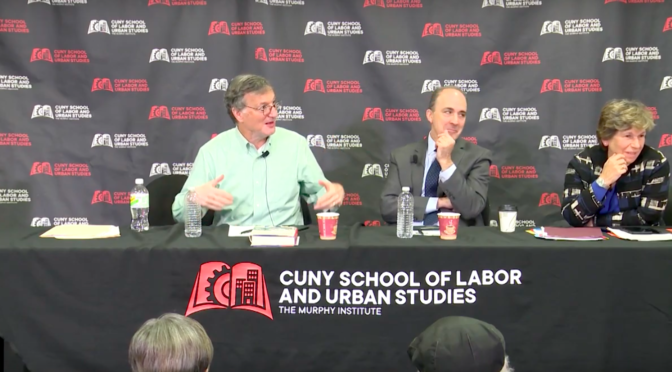On Friday, November 15th, SLU hosted a Labor Forum on the future of labor rights. 135 people attended to hear how the labor movement can fight for workers’ rights and protections while the Trump administration continues to attempt to roll them back.
Featured speakers included:
- Randi Weingarten — President of the American Federation of Teachers (AFT).
- Steven Greenhouse — Veteran New York Times labor journalist and author of the new book, Beaten Down, Worked Up: The Past, Present, and Future of American Labor.
- Vincent Alvarez – President of NYC Central Labor Council, AFL-CIO
Although union density is near an all-time low, labor activism has surged in many sectors. From adjunct faculty to video game developers, digital media workers, platform app drivers, and public school teachers, labor movement activism is growing in a number of key sectors. This is happening as many full-time jobs with benefits are disappearing, consumer/student debt is skyrocketing, the “gig economy” is expanding, and economic insecurity is increasing for American workers and families. Housing and child care costs – which heavily impact workers’ income, wealth, and health – have also become more burdensome for many families. Under President Trump, a number of worker rights and protections have been weakened or denied, including:
• No movement toward federal minimum wage increase
• Weak overtime protections for salaried workers
• Allowing employers to self-report wage violations and escape penalties • Siding with employers against rights of gay and transgender workers
• (Mis)classifying Uber drivers and others as independent contractors, denying them basic rights
• Continuing ‘Right-to-Work’ efforts kickstarted by Supreme Court’s Janus decision
• Restricting workers’ right to organize at franchised businesses like McDonald’s
• De-funding and weakening OSHA
What should be Democrats’ top policy priorities to strengthen all workers’ rights? What are the most significant gaps and weaknesses in protections for worker organizing and economic rights today? ‘Right-to-work’ laws? Legal constraints against strikes and other worker actions? Minimum wage? The growing numbers of workers who fall outside the protections of the NLRA? Lack of livable safety net benefits for displaced and underemployed workers? Lack of protections for flex/gig workers? What new policies would best promote stronger worker protections and greater economic justice?




